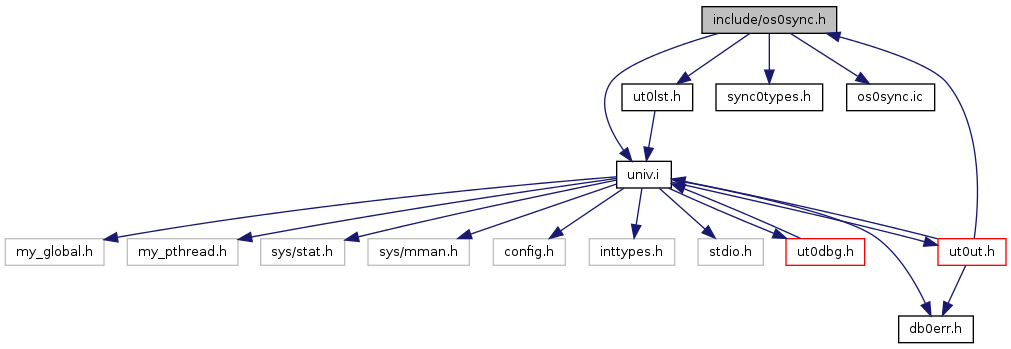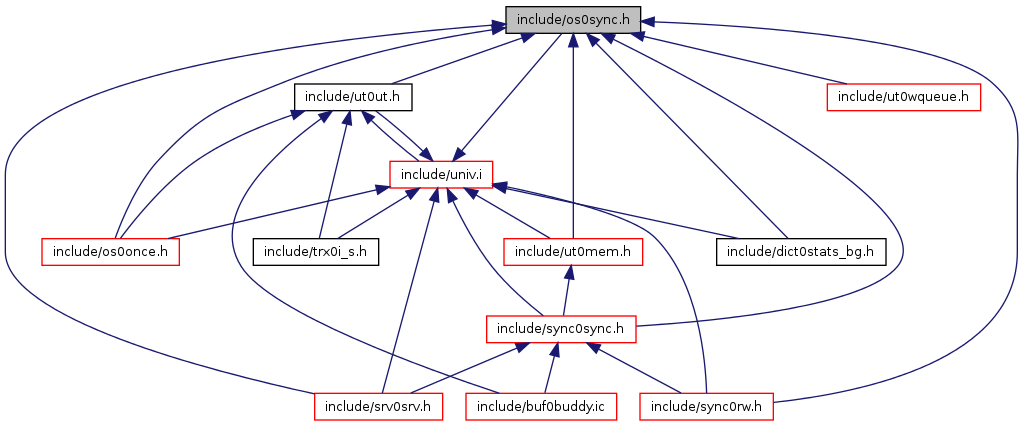

Go to the source code of this file.
Data Structures | |
| struct | os_fast_mutex_t |
| struct | os_event |
Macros | |
| #define | OS_SYNC_INFINITE_TIME ULINT_UNDEFINED |
| #define | OS_SYNC_TIME_EXCEEDED 1 |
| #define | os_event_wait(event) os_event_wait_low(event, 0) |
| #define | os_event_wait_time(event, t) os_event_wait_time_low(event, t, 0) |
| #define | os_fast_mutex_init(K, M) os_fast_mutex_init_func(&((os_fast_mutex_t*)(M))->mutex) |
| #define | os_fast_mutex_lock(M) os_fast_mutex_lock_func(&((os_fast_mutex_t*)(M))->mutex) |
| #define | os_fast_mutex_unlock(M) os_fast_mutex_unlock_func(&((os_fast_mutex_t*)(M))->mutex) |
| #define | os_fast_mutex_free(M) os_fast_mutex_free_func(&((os_fast_mutex_t*)(M))->mutex) |
| #define | IB_ATOMICS_STARTUP_MSG "Mutexes and rw_locks use InnoDB's own implementation" |
| #define | os_atomic_inc_ulint(m, v, d) os_atomic_inc_ulint_func(m, v, d) |
| #define | os_atomic_dec_ulint(m, v, d) os_atomic_dec_ulint_func(m, v, d) |
| #define | os_increment_counter_by_amount(mutex, counter, amount) |
| #define | os_decrement_counter_by_amount(mutex, counter, amount) |
| #define | os_inc_counter(mutex, counter) os_increment_counter_by_amount(mutex, counter, 1) |
| #define | os_dec_counter(mutex, counter) |
| #define | os_rmb |
| #define | os_wmb |
| #define | IB_MEMORY_BARRIER_STARTUP_MSG "Memory barrier is not used" |
Typedefs | |
| typedef pthread_mutex_t | fast_mutex_t |
| typedef pthread_cond_t | os_cond_t |
| typedef struct os_event * | os_event_t |
| typedef struct os_mutex_t * | os_ib_mutex_t |
Functions | |
| UNIV_INTERN void | os_sync_init (void) |
| UNIV_INTERN void | os_sync_free (void) |
| UNIV_INTERN os_event_t | os_event_create (void) |
| UNIV_INTERN void | os_event_set (os_event_t event) |
| UNIV_INTERN ib_int64_t | os_event_reset (os_event_t event) |
| UNIV_INTERN void | os_event_free (os_event_t event) |
| UNIV_INTERN void | os_event_wait_low (os_event_t event, ib_int64_t reset_sig_count) |
| UNIV_INTERN ulint | os_event_wait_time_low (os_event_t event, ulint time_in_usec, ib_int64_t reset_sig_count) |
| UNIV_INTERN os_ib_mutex_t | os_mutex_create (void) |
| UNIV_INTERN void | os_mutex_enter (os_ib_mutex_t mutex) |
| UNIV_INTERN void | os_mutex_exit (os_ib_mutex_t mutex) |
| UNIV_INTERN void | os_mutex_free (os_ib_mutex_t mutex) |
| UNIV_INLINE ulint | os_fast_mutex_trylock (os_fast_mutex_t *fast_mutex) |
| UNIV_INTERN void | os_fast_mutex_unlock_func (fast_mutex_t *fast_mutex) |
| UNIV_INTERN void | os_fast_mutex_init_func (fast_mutex_t *fast_mutex) |
| UNIV_INTERN void | os_fast_mutex_lock_func (fast_mutex_t *fast_mutex) |
| UNIV_INTERN void | os_fast_mutex_free_func (fast_mutex_t *fast_mutex) |
Variables | |
| os_ib_mutex_t | os_sync_mutex |
| ulint | os_thread_count |
| ulint | os_event_count |
| ulint | os_mutex_count |
| ulint | os_fast_mutex_count |
Detailed Description
The interface to the operating system synchronization primitives.
Created 9/6/1995 Heikki Tuuri
Macro Definition Documentation
| #define IB_ATOMICS_STARTUP_MSG "Mutexes and rw_locks use InnoDB's own implementation" |
Atomic compare-and-swap and increment for InnoDB.
| #define os_dec_counter | ( | mutex, | |
| counter | |||
| ) |
| #define os_decrement_counter_by_amount | ( | mutex, | |
| counter, | |||
| amount | |||
| ) |
| #define os_increment_counter_by_amount | ( | mutex, | |
| counter, | |||
| amount | |||
| ) |
Following macros are used to update specified counter atomically if HAVE_ATOMIC_BUILTINS defined. Otherwise, use mutex passed in for synchronization
| #define os_rmb |
barrier definitions for memory ordering
| #define OS_SYNC_INFINITE_TIME ULINT_UNDEFINED |
Denotes an infinite delay for os_event_wait_time()
| #define OS_SYNC_TIME_EXCEEDED 1 |
Return value of os_event_wait_time() when the time is exceeded
Typedef Documentation
| typedef pthread_mutex_t fast_mutex_t |
Native mutex
| typedef pthread_cond_t os_cond_t |
Native condition variable
| typedef struct os_event* os_event_t |
Operating system event handle
| typedef struct os_mutex_t* os_ib_mutex_t |
Operating system mutex handle
Function Documentation
| UNIV_INTERN os_event_t os_event_create | ( | void | ) |
Creates an event semaphore, i.e., a semaphore which may just have two states: signaled and nonsignaled. The created event is manual reset: it must be reset explicitly by calling sync_os_reset_event.
- Returns
- the event handle
| UNIV_INTERN void os_event_free | ( | os_event_t | event | ) |
Frees an event object. in: event to free
| UNIV_INTERN ib_int64_t os_event_reset | ( | os_event_t | event | ) |
Resets an event semaphore to the nonsignaled state. Waiting threads will stop to wait for the event. The return value should be passed to os_even_wait_low() if it is desired that this thread should not wait in case of an intervening call to os_event_set() between this os_event_reset() and the os_event_wait_low() call. See comments for os_event_wait_low(). in: event to reset
| UNIV_INTERN void os_event_set | ( | os_event_t | event | ) |
Sets an event semaphore to the signaled state: lets waiting threads proceed. in: event to set
| UNIV_INTERN void os_event_wait_low | ( | os_event_t | event, |
| ib_int64_t | reset_sig_count | ||
| ) |
Waits for an event object until it is in the signaled state.
Typically, if the event has been signalled after the os_event_reset() we'll return immediately because event->is_set == TRUE. There are, however, situations (e.g.: sync_array code) where we may lose this information. For example:
thread A calls os_event_reset() thread B calls os_event_set() [event->is_set == TRUE] thread C calls os_event_reset() [event->is_set == FALSE] thread A calls os_event_wait() [infinite wait!] thread C calls os_event_wait() [infinite wait!]
Where such a scenario is possible, to avoid infinite wait, the value returned by os_event_reset() should be passed in as reset_sig_count. in: zero or the value returned by previous call of os_event_reset().
- Parameters
-
event in: event to wait
| UNIV_INTERN ulint os_event_wait_time_low | ( | os_event_t | event, |
| ulint | time_in_usec, | ||
| ib_int64_t | reset_sig_count | ||
| ) |
Waits for an event object until it is in the signaled state or a timeout is exceeded. In Unix the timeout is always infinite.
- Returns
- 0 if success, OS_SYNC_TIME_EXCEEDED if timeout was exceeded in: zero or the value returned by previous call of os_event_reset().
- Parameters
-
event in: event to wait time_in_usec in: timeout in microseconds, or OS_SYNC_INFINITE_TIME
| UNIV_INTERN void os_fast_mutex_free_func | ( | fast_mutex_t * | fast_mutex | ) |
Frees an mutex object. in: mutex to free
| UNIV_INTERN void os_fast_mutex_init_func | ( | fast_mutex_t * | fast_mutex | ) |
Initializes an operating system fast mutex semaphore. in: fast mutex
| UNIV_INTERN void os_fast_mutex_lock_func | ( | fast_mutex_t * | fast_mutex | ) |
Acquires ownership of a fast mutex. in: mutex to acquire
| UNIV_INLINE ulint os_fast_mutex_trylock | ( | os_fast_mutex_t * | fast_mutex | ) |
Acquires ownership of a fast mutex. Currently in Windows this is the same as os_fast_mutex_lock!
- Returns
- 0 if success, != 0 if was reserved by another thread in: mutex to acquire
Acquires ownership of a fast mutex.
- Returns
- 0 if success, != 0 if was reserved by another thread
- Parameters
-
fast_mutex in: mutex to acquire
| UNIV_INTERN void os_fast_mutex_unlock_func | ( | fast_mutex_t * | fast_mutex | ) |
Releases ownership of a fast mutex. in: mutex to release
| UNIV_INTERN os_ib_mutex_t os_mutex_create | ( | void | ) |
Creates an operating system mutex semaphore. Because these are slow, the mutex semaphore of InnoDB itself (ib_mutex_t) should be used where possible.
- Returns
- the mutex handle
| UNIV_INTERN void os_mutex_enter | ( | os_ib_mutex_t | mutex | ) |
Acquires ownership of a mutex semaphore. in: mutex to acquire
| UNIV_INTERN void os_mutex_exit | ( | os_ib_mutex_t | mutex | ) |
Releases ownership of a mutex. in: mutex to release
| UNIV_INTERN void os_mutex_free | ( | os_ib_mutex_t | mutex | ) |
Frees an mutex object. in: mutex to free
| UNIV_INTERN void os_sync_free | ( | void | ) |
Frees created events and OS 'slow' mutexes.
| UNIV_INTERN void os_sync_init | ( | void | ) |
Initializes global event and OS 'slow' mutex lists.
Variable Documentation
| os_ib_mutex_t os_sync_mutex |
Mutex protecting counts and the event and OS 'slow' mutex lists
| ulint os_thread_count |
This is incremented by 1 in os_thread_create and decremented by 1 in
os_thread_exit
 1.8.1.2
1.8.1.2